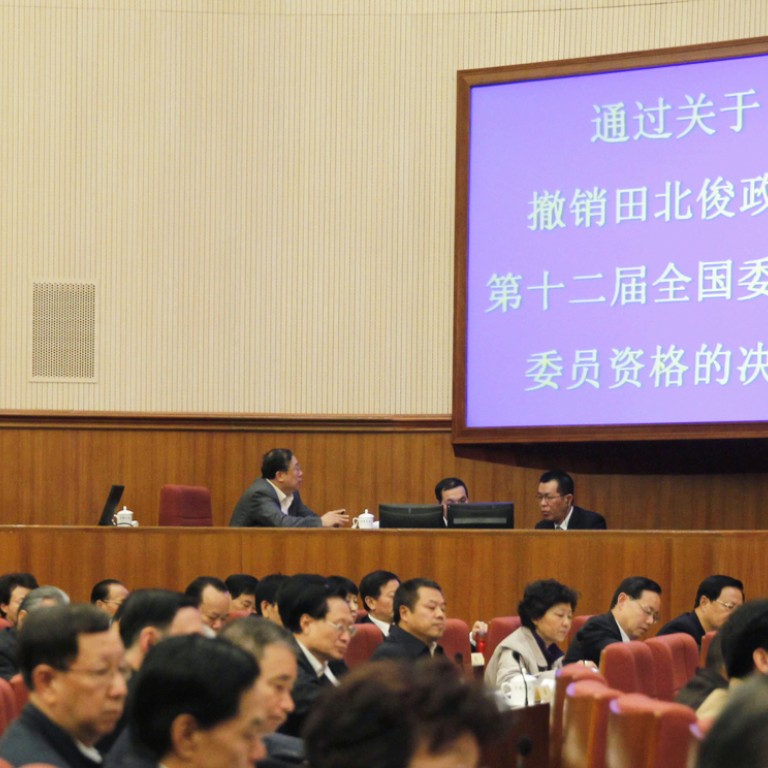
James Tien's dismissal a sign Beijing doesn't want anyone rocking the boat
James Tien's dismissal from nation's top political advisory body is a clear message to the pro-establishment camp to toe the line on Leung
The message behind Beijing's sacking of James Tien Pei-chun as a member of the nation's top political advisory body is loud and clear for pro-establishment figures - toe the line and rally behind Chief Executive Leung Chun-ying or, at the very least, don't rock the boat.
Two political commentators said the unprecedented decision by the Chinese People's Political Consultative Conference (CPPCC) Standing Committee to remove Tien should be understood in the wider context of Beijing's dissatisfaction with the ambiguous position of the city's business heavyweights on the Occupy Central protests.
Tien has a track record of deviating from the stance of the Hong Kong and central governments. His resignation from the Executive Council, days after the huge July 1 protest march in 2003, forced then chief executive Tung Chee-hwa to withdraw controversial national security legislation.
A day after this year's July 1 march, Tien suggested Leung should consider resigning since the number of people who took to the streets was inexplicable given the economy's current strength and the high degree of social stability in Hong Kong.
The organisers estimated 510,000 people took part in the march, while a study commissioned by the estimated 140,000 people took part.
On Friday, the tycoon-politician urged Leung to consider resigning since he could hardly govern effectively. Tien, who backed former chief secretary Henry Tang Ying-yen in the 2012 chief executive election, is a longtime critic of Leung.
Political commentator Johnny Lau Yui-siu said Beijing had been unhappy with Tien's divergent views and flip-flops in the past decade.
"Beijing's patience with Tien was exhausted, as his call for Leung to consider resigning came at the height of Occupy Central. It's completely intolerable, as Beijing is supporting Leung during the crisis at all costs," Lau said.
The role of the CPPCC - which is made up of delegates from various political parties and organisations as well as experts from different sectors - is similar to that of an upper legislative chamber which does not enjoy real power. Of the 2,237 CPPCC members, 200-plus represent Hong Kong.
READ MORE: To view all the latest Occupy Central stories click here
"Beijing wants to tell other figures from the pro-establishment camp not to follow in Tien's footsteps by punishing him," Lau said. "Don't rock the boat in the time of crisis is Beijing's message for the pro-establishment figures."
Beijing has rejected the possibility of Leung resigning, a core demand of protest leaders.
Xinhua issued an English- language news report at noon on Saturday saying many Hong Kong tycoons, such as Henderson Land Development chairman Lee Shau-kee and Wharf Holdings chairman Peter Woo Kwong-ching, had remained "mute" on Occupy.
It noted that Li Ka-shing, Cheung Kong (Holdings) chairman, had issued a statement on October 15 calling on the Occupy protesters to go home and not to "let today's passion become tomorrow's regrets". "Asia's wealthiest man did not make it clear whether or not he agrees with the appeals of the protesters," the report said.
The Xinhua report said Tung was among the few Hong Kong tycoons to have voiced opposition to the movement.
Contrary to the report, Lee said on September 21 that the mass sit-in would have a very "negative impact on Hong Kong" and damage its reputation as an international financial centre.
On October 11, Woo said the Occupy movement had been successful in showing Hong Kong's freedom of speech to the world. But he said occupying the roads illegally would not be sustainable.
The report was retracted seven hours after it was issued. At 9pm that night Xinhua issued a Chinese-language report saying several Hong Kong business leaders, including Li and others named in the first article, had criticised the Occupy protests.
It issued a similar report in English some 90 minutes later. It is not clear why the first article was taken down.
Lui Che- woo, chairman of the K Wah Group, said in a statement uploaded on his company's website yesterday that he had been opposing any activities which undermine Hong Kong's stability and prosperity.
He said he was heartbroken about the recent turmoil arising from Occupy Central.
Ivan Choy Chi-keung, a political scientist at Chinese University, said Beijing was taking a tough stand on Occupy Central. "Pro-establishment figures will be criticised even if they remain silent on the movement," he said.

